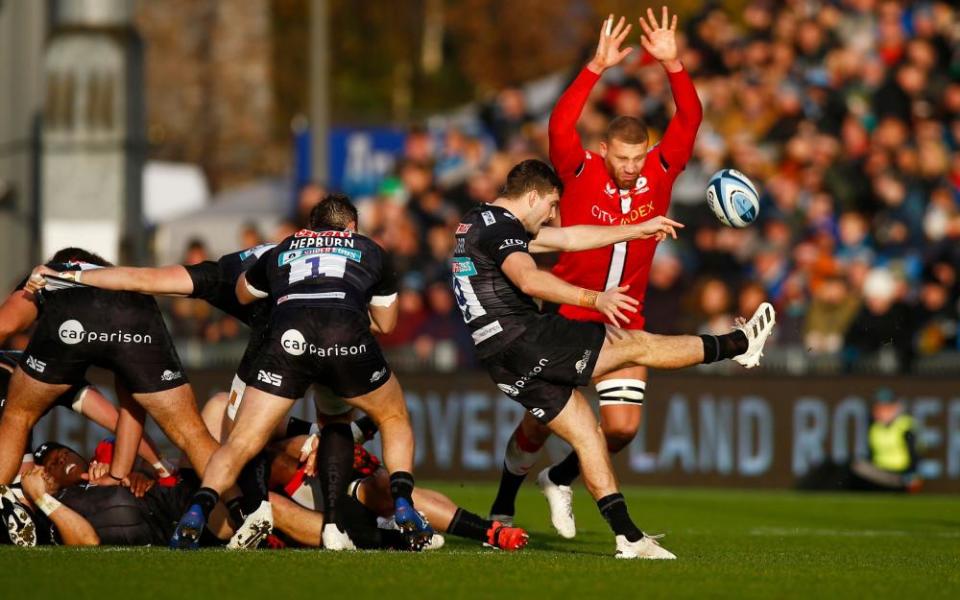Improving English clubs await moment of truth in Champions Cup

The Premiership can claim to be relentlessly competitive but Europe will be the test of whether standards have really risen
There are two schools of thought out there – and probably always will be. The first is that the Gallagher Premiership, English rugby’s flagship competition, is the toughest league in the world. The second, most often heard across the Irish Sea, is that saying something loudly and often enough does not automatically make it true, particularly when Leinster put out their best available side.
It is one of those tail-chasing arguments that rarely produces a definitive conclusion, even at this time of the year. Does it really mean, if Leinster were to smash a severely diluted Bath in the Heineken Champions Cup this Saturday, that the English are all lame ducks? Or vice versa if Munster, currently ensnared in Covid’s web, cannot conquer Wasps in Coventry? As representative samples go, neither feels massively scientific.
Related: Champions Cup organisers relax Covid rules following Scarlets appeal
Even Leicester’s trip to Bordeaux, pitting the Premiership’s pacesetters against the Top 14 leaders, will offer only a fleeting snapshot rather than a full widescreen picture. Better to wait, maybe, until the French side have to make the return trip to Welford Road. Or until the semi-finalists are known. Unless you take the view that the Six Nations is, ultimately, the only true guide. It depends, as ever, on your personal vantage point.
Regardless of any looming French/Irish takeover, however, there is little doubt several Premiership sides are on the up. It might not be instantly apparent across Europe this season – although the Challenge Cup might be a different story – but the opening tranche of league fixtures has seen a distinct shift with Leicester, Gloucester and London Irish all performing appreciably better than last season.
Harlequins, Exeter and Saracens, meanwhile, have all won a domestic title within the past three seasons and remain hungry for more. Northampton, Newcastle, Sale, Wasps and, latterly, Worcester have all had their encouraging moments. Even Bristol and Bath, presently doing it tough, have well funded squads and will regroup at some stage. Recently, in round nine, there was only one home win among the six weekend fixtures.
A sign of the dog-eat-dog times? At its best the Premiership can claim to be relentlessly competitive, with talented players from home and abroad, rousing backdrops and some smart new emerging coaches. Just as crucially, though, it appears to be a league in which standards are rising virtually across the board. The Covid lockdown seems to have prompted several people to stop, take stock and re-boot themselves.
No one who saw Gloucester pick off Bristol on Friday, for example, could fail to notice their steady improvement under George Skivington’s beady eye. In terms of organisation, aggression at the breakdown, defence and collective understanding, the Cherry & Whites are clearly on an upward trajectory. Chris Harris’s try was a prime example, with the timing and placement of his centre partner Mark Atkinson’s exquisite left-footed grubber little short of perfect.

London Irish do not yet ooze consistency from every pore but, in addition to winning at Exeter and Harlequins this season and drawing at Saracens, they have scored 40 tries, four more than any other team. The past weekend also underlined that, when it matters, the Tigers and the Chiefs have the forward muscle and determination to withstand high-class visitors, with London’s two international-scattered teams both sent packing having registered one try between them.
Some have suggested these were not pretty contests to watch but since when was rugby meant to resemble an old-school beauty pageant? To these eyes both were highly absorbing, rugged games of rugby in difficult conditions, full of spirit and passion if not bucketfuls of tries. They also looked and felt – relevantly to this discussion – like properly big games. How often do the Welsh regions play domestic fixtures in front of packed stands with the same crackle of genuine electricity in the air?
This is important because it is the key to professional club rugby, wherever it is played. Ugly or beautiful, dry or wet, hot or cold, full or empty, the occasion absolutely has to matter. If few outside the two teams or towns involved are greatly bothered, even the best of games will not spread rugby’s gospel. The Six Nations clearly matters hugely, which is why so many millions of people watch it. To date the United Rugby Championship, still in its infancy, has yet to deliver that unmissable quality.
There is, inevitably, a caveat. While there may be encouraging signs of a broader Premiership base of potential winners, it is too early to make sweeping assumptions. How much will interest hold up at English clubs in the lower reaches of the table this spring with no relegation and little except pride at stake if the top eight Champions Cup qualifying slots are all but filled? Good for player development, in some cases, but the lack of jeopardy clearly has its downsides.
With the play-offs not until June and Bath staying up regardless, certain international players may end up featuring even less for their clubs than they do already. Which potentially makes the whole league less easy to market despite the rising try counts. Not to mention even less meaningful at the bottom end. Progress? There remain, as ever, two sharply contrasting schools of thought.
• This is an extract from our rugby union email, the Breakdown. To subscribe, just visit this page and follow the instructions.

 Yahoo News
Yahoo News 